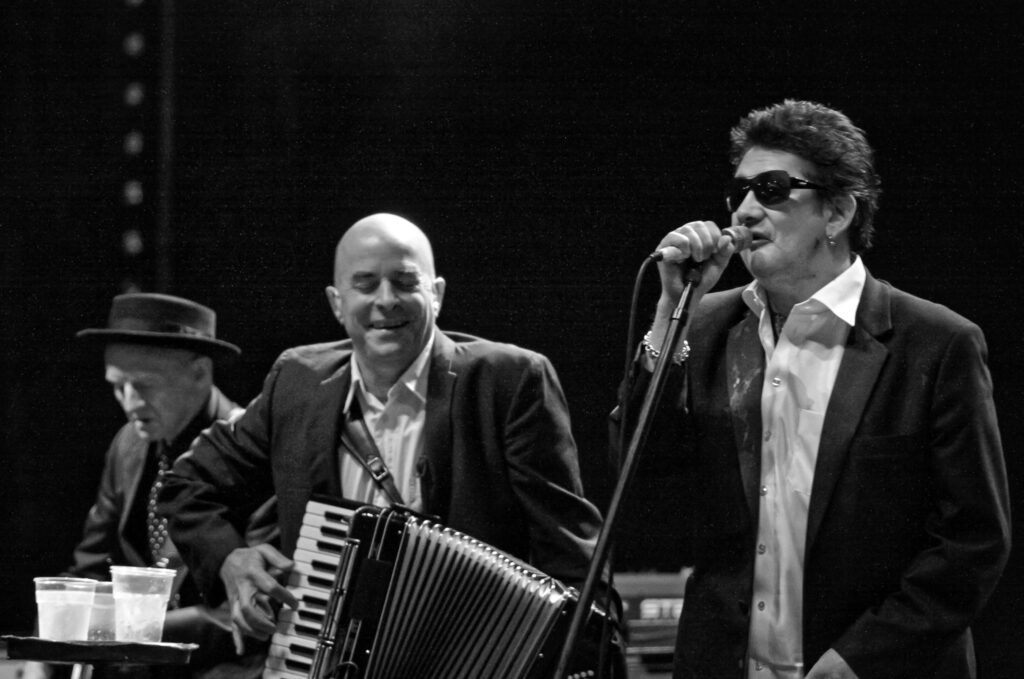
It was perhaps fitting that Shane MacGowan should be born on Christmas Day in 1957. The legendary singer-songwriter is best known for the perennial festive hit ‘Fairytale Of New York.’ Yet over his 65 years, he amassed an incredible body of work, with The Pogues and beyond. While his drink and drug consumption was legendary, it is surely for his musical legacy that he will be ultimately remembered.
Proud of his Irish identity, he was actually born in Pembery, Kent, the son of Irish immigrants. His childhood saw him spend much of his early life in Tipperary in Ireland’s province of Munster, but he was schooled in England. This would include two years at Westminster, a leading public school in London, to which he won a scholarship, but was expelled after his second year. He later told The Guardian: ‘At Westminster, I started doing pills and acid and going to the pub. I didn’t last there very long. I got nicked for smoking a joint and was kicked out. My mother was a bit upset, but my father wasn’t. He didn’t think that I was getting a lot out of school.’ His childhood seems to be so incredible that it seems too wild to have come out of a novel (even if possibly romanticised): the boy who first started drinking Guinness aged five, but who also tackled James Joyce‘s Finnegans Wake [sic] with his father aged eleven.
Like so many men of his generation, MacGowan was fired up by punk, particularly the likes of the Sex Pistols and The Clash. He first became legendary on the punk scene, when at a Clash gig in 1976, he had his earlobe bitten by a future member of the Mo-dettes, the ensuing headlines about cannibalism at punk gigs adding to the furore that the movement caused. He formed The Nipple Erectors, who became known as the Nips for perhaps obvious reasons; members included bassist Shane Bradley, who would go on to The Men They Couldn’t Hang, contemporaries of The Pogues who would also marry the fury and energy of punk with Irish folk music.
[embedded content]
In the early 1980s as The Nips faded away after four singles, he set about combining folk with punk and after a brief stint with The New Republicans, he formed Pogue Mahone. The band played their first gig in 1982 at the Pindar Of Wakefield pub in London’s King’s Cross (the venue now known as The Water Rats). A self-released single ‘The Dark Streets Of London‘ ruffled feathers of some of Scotland’s Gaelic-speaking community who understood that it means ‘kiss my arse’. The band would be known as The Pogues from 1984 onwards. They released five albums over the course of the next few years, that lyrically saw MacGowan reflecting on the Irish diaspora both in the UK and the US, Irish Republicanism and life in London, amongst other topics. The band also drew on other writers, covering Brendan Behan‘s ‘The Auld Triangle‘, Eric Bogle‘s ‘And The Band Played Waltzing Matilda‘ and Ewan MacColl‘s ‘Dirty Old Town.’
[embedded content]
It was Ewan MacColl’s daughter, Kirsty, who would join the Pogues for ‘Fairytale Of New York‘ the tragi-comic tale of a fighting couple on Christmas Eve. The song took two years to come to fruition, but its longevity has seen it rival the likes of Wham! and Mariah Carey for the most popular Christmas hit. It reached no.1 in Ireland and no.2 in the UK that year, but particularly in the download and streaming era, it has regularly re-charted over the last fifteen years, and sales are well over seven figures in the UK alone.
[embedded content]
The critical and commercial success of the band were challenged by MacGowan’s hedonistic lifestyle; after the fifth album Hell’s Ditch, in 1990, he was finally dismissed from the band the following year. The Pogues would release two more albums over the next few years, MacGowan would form a new band The Popes. He would also collaborate with the likes of Nick Cave (the two recorded a duet of ‘What A Wonderful World‘ that was released as a single) and Sinéad O’Connor – the two recording a duet of ‘Haunted‘, a song from the the soundtrack of Sid and Nancy that the Pogues had released a decade earlier.
[embedded content]
While the Pogues would reunite with MacGowan for tours in the twenty-first century, they would record no more new material. MacGowan would make fewer appearances in the last decade of his life, battling health problems and spending much of the last year in hospital. He was able to return home to his wife Victoria for the last few weeks of his life.
As I write, on the iTunes Top 200, ‘Fairytale Of New York‘ appears no less than five times on iTunes, but it is gratifying to note that other tunes from his career also appear. As news of his ill-health circulated, the likelihood of it finally reaching no.1 in the UK 36 years after it was released increased; it now seems a dead cert. But chart positions do not tell the whole story of a man who was larger than life for all of his 65 years, and who is rightly mourned by many. While he may have been portrayed (by himself and others) as an Irish rebel, the Irish President Michael D. Higgins was amongst those to pay tribute, stating :’Shane will be remembered as one of music’s greatest lyricists. So many of his songs would be perfectly crafted poems, if that would not have deprived us of the opportunity to hear him sing them.’
Photos of Shane MacGowan with The Pogues at Stockton Weekender festival, August 2012: Simon Godley
